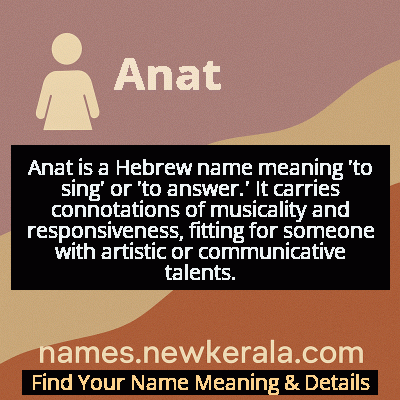Anat Name Meaning & Details
Origin, Popularity, Numerology Analysis & Name Meaning of Anat
Discover the origin, meaning, and cultural significance of the name ANAT. Delve into its historical roots and explore the lasting impact it has had on communities and traditions.
Name
Anat
Gender
Female
Origin
Hebrew
Lucky Number
9
Meaning of the Name - Anat
Anat is a Hebrew name meaning 'to sing' or 'to answer.' It carries connotations of musicality and responsiveness, fitting for someone with artistic or communicative talents.
Anat - Complete Numerology Analysis
Your Numerology Number
Based on Pythagorean Numerology System
Ruling Planet
Mars
Positive Nature
Generous, passionate, energetic, and humanitarian.
Negative Traits
Impulsive, impatient, moody, and can be overly emotional.
Lucky Colours
Red, maroon, scarlet.
Lucky Days
Tuesday.
Lucky Stones
Red coral, garnet.
Harmony Numbers
1, 2, 3, 6.
Best Suited Professions
Military, sports, philanthropy, leadership roles.
What People Like About You
Courage, energy, leadership, generosity.
Famous People Named Anat
Anat Hoffman
Activist
Leader of Women of the Wall movement fighting for women's religious rights at the Western Wall
Anat Zuria
Filmmaker
Award-winning Israeli director known for films exploring women's issues in Orthodox Judaism
Anat Cohen
Jazz Musician
Grammy-nominated clarinetist and saxophonist, multiple Jazz Journalists Association awards winner
Anat Atzmon
Singer
Israeli singer known for her work in musical theater and popular music recordings
Name Variations & International Equivalents
Click on blue names to explore their detailed meanings. Gray names with will be available soon.
Cultural & Historical Significance
The name carries the legacy of a powerful female deity who defied traditional gender roles, embodying both martial prowess and feminine power in a way that was unique among ancient Near Eastern goddesses. During the Bronze Age, Anat was worshipped across the Levant and even found her way into Egyptian religion during the Hyksos period. Her cult was particularly strong among warriors and royalty, who sought her protection in battle. The enduring cultural significance of Anat lies in her representation of complete feminine agency - a goddess who answered to no male authority and operated according to her own moral code.
Extended Personality Analysis
Women named Anat typically exhibit strong, independent personalities with a natural leadership quality. They tend to be determined and resilient, capable of overcoming significant challenges through sheer willpower and strategic thinking. Like their namesake goddess, they often possess a dual nature - combining strength and assertiveness with deep emotional sensitivity and nurturing instincts. Anats are frequently creative and expressive, whether through artistic pursuits, intellectual endeavors, or social activism.
They value authenticity and are not afraid to speak their minds or challenge conventions when they believe in a cause. Their confidence can sometimes be mistaken for arrogance, but those who know them well appreciate their loyalty and protective nature toward loved ones. This combination of warrior spirit and compassionate heart makes them compelling and memorable individuals who leave a lasting impact on those they encounter. Anats often excel in fields that require both analytical thinking and emotional intelligence, making them effective leaders, artists, and advocates for social change.
Modern Usage & Popularity
In contemporary times, Anat remains primarily used within Jewish and Israeli communities, though it has gained some international recognition. The name maintains moderate popularity in Israel, where it's seen as both traditional and strong, often chosen by parents who want to honor ancient Hebrew heritage while giving their daughter a name that conveys strength and independence. Outside Israel, it's occasionally adopted by parents seeking a name with deep historical roots and feminist connotations, particularly among those interested in mythology or ancient Near Eastern studies. The name's usage reflects a growing appreciation for powerful female figures from mythology and a trend toward names that break away from traditional gender expectations. While not among the most popular names globally, Anat has a distinctive quality that appeals to those wanting a name with cultural depth and gender-neutral strength.
Symbolic & Spiritual Meanings
Symbolically, Anat represents the harmonious integration of seemingly contradictory qualities - war and peace, destruction and creation, violence and nurturing. She embodies the concept of sacred feminine power that encompasses both protective fierceness and life-giving compassion, serving as a reminder that true strength includes the capacity for both defense and care. The name symbolizes resilience in adversity, the courage to fight for what one believes in, and the ability to transform challenges into opportunities for growth and renewal. Anat also represents independence and self-determination, reflecting an individual who defines their own path rather than conforming to societal expectations or limitations. In a broader sense, the name carries the symbolism of cultural preservation and the reclamation of ancient feminine divinities in modern contexts, connecting contemporary identity with deep historical roots while advocating for gender equality and personal empowerment.

